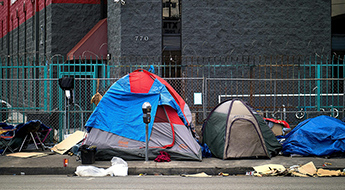Top-Notch Methods Training
IPR-led workshops provide unique opportunity to improve research capacity
Get all our news

Graduate Student Makeda Austin explains how to use a blood pressure machine during the SIBASS workshop.
Two IPR faculty-led trainings over the summer allowed more than 50 researchers from across the United States to hone their methodological skills and improve their capacity for conducting methodologically rigorous social science research.
Summer Institute in Biological and Social Sciences
The Summer Institute in Biological and Social Sciences, or SIBASS, took place from June 10–14, at Northwestern University. Supported by the Russell Sage Foundation, the JBP Foundation, the School for Education and Social Policy, and IPR, the workshop welcomed more than 35 postdoctoral fellows and junior faculty in the social sciences from across the nation.
“It was fantastic week. We had a spectacular group of participants from across the social sciences who were eager to learn how biological approaches could be integrated into their research programs on inequality,” said IPR health psychologist Greg Miller. “The goal was for us—the workshop faculty—to do most of the teaching. But I think we learned at least as much from the trainees as they learned from us.”
The unique weeklong program included interdisciplinary lectures and hands-on exercises in how to integrate measures of human biology into studies of just a few dozen participants up to nationally representative studies with thousands of participants. The objective of such measures is to permit more in-depth understanding of the complex interplay between social contexts, biology, and inequalities in health outcomes and human capital.
One of the institute’s participants, Kam Sripada, a postdoctoral fellow in global health from the Norwegian University of Science and Technology, spoke about how the workshop opened her eyes to some of the collaborative possibilities between biomarker experts, social science and public health experts, historians, and ethicists.
“This workshop has reminded me how important the interdisciplinary collaborations are to connect biomarkers and bigger picture questions,” Sripada said.

Miller co-led the workshop with IPR psychologists Edith Chen and Robin Nusslock; developmental psychologist and IPR associate Claudia Haase; IPR psychobiologist Emma Adam; and IPR biological anthropologists Thomas McDade and Christopher Kuzawa. Sessions addressed a wide variety of conceptual, technical, and ethical challenges when conducting biosocial research.
Participants practiced a variety of field-friendly techniques from gathering and analyzing saliva and dried blood spots for markers of stress, immune function, and others. They discussed how to frame biosocial research questions most effectively, and learned about the basic biology of bodily systems involved in stress and disease. There were also sessions with practical information on navigating institutional review boards and engaging diverse communities. They also engaged in reflective discussions of ethical concerns in this area of research.
“The interactive learning sessions got us out of our seats,” said Jessica Elm, a postdoctoral researcher at Johns Hopkins, Bloomberg School of Public Health, Center for American Indian Health.
Elm works with tribal communities in Minnesota and Wisconsin, and she and her colleagues are thinking more about incorporating biological measures into their studies. SIBASS provided a unique overview for her to learn more about such measures. In addition to the knowledge she acquired, she also appreciated getting to know a community of like-minded scholars and mentors.
“The key for me is recognizing the genuine investment of the [institute’s] leadership into younger scholars,” Elm said, “because that's what we're going to be able to rely on when we move forward in our career.”
The SIBASS workshop expanded upon a previous training program, the Summer Biomarker Institute, which Adam, Kuzawa, and McDade ran from 2006–11 at Northwestern University. It was one of the pioneering trainings for biomarkers at the time.
Cluster-Randomized Trials Institute
The Cluster-Randomized Trials, or CRT, Institute offered 30 education researchers a deep dive into how to design, analyze, and conduct such education studies from July 8–18 in Evanston, Illinois. The National Center for Education Research (NCER) in the U.S. Department of Education’s Institute for Education Sciences provided workshop funding as part of their mission to find “what works” in education research and disseminate that knowledge.
“The CRT Training Institute has been a core piece of our ability to answer that question [and] to train folks to answer that question,” said Elizabeth Albro, NCER Commissioner of Education Research.

Led by IPR statistician and education researcher Larry Hedges, the 13th edition of the workshop aimed to inform participants in how best to design and conduct a CRT. A CRT randomly assigns clusters, or groups such as classes or schools, to a treatment rather than randomizing individuals to a treatment.
“Randomized field trials have become a crucial methodology in education research. Yet, relatively few graduate programs offer adequate preparation to learn how to use this methodology,” Hedges noted. “This summer institute provides an opportunity for established researchers to learn how to design, conduct, analyze, and interpret randomized field trials.”
In addition to studying CRT methodology, the participants work in small teams to propose possible education research studies as the final part of the workshop. Both the methodology and the team work aspects made the workshop very valuable, according to Albro.
“Doing group science is hard,” she explained, and the “boot camp type of training where you are all required to work together . . . is really helpful for building skills beyond just methodology.”
A key goal of the workshop is to enable participants to bring their new skills to bear on educational research in their own organizations.
Guodong Liang, a research specialist at the nonprofit Community Training and Assistance Center (CTAC), praised the workshop for pushing his professional growth as well as that of his organization.
“I strongly believe this workshop enables us to provide more high-quality services to the many state, district, and school educators [CTAC serves],” Liang said.
“I don’t think I’ve ever been to a conference or a training that spurred so much activity afterwards,” said Karen Armstrong, a senior research associate at IMPAQ International, LLC, a private research firm.
Since attending the workshop, she has been passing on her training to colleagues. “It’s been a burst of energy that we really needed,” Armstrong said.
In addition to Hedges, participating faculty included IPR statistician Elizabeth Tipton (WCAS PhD 2011), Spyros Konstantopoulos of Michigan State University, Jessaca Spybrook of Western Michigan, Mark Lipsey of Vanderbilt, Chris Rhoads (WCAS PhD 2008) of the University of Connecticut, Laura Stapleton of the University of Maryland, Carol Connor of UC-Irvine, as well as IPR graduate postdoctoral fellows and research assistants.
Emma Adam is professor of human development and social policy and an IPR fellow. Edith Chen is John D. and Catherine T. MacArthur Chair and Professor of Psychology and an IPR fellow. Claudia Haase is assistant professor of human development and social policy and of psychology and an IPR associate. Larry Hedges is Board of Trustees Professor of Statistics and Education and Social Policy and an IPR fellow. Christopher Kuzawa is professor of anthropology and an IPR fellow. Thomas McDade is the Carlos Montezuma Professor of Anthropology and an IPR fellow. Greg Miller is the Louis W. Menk Professor of Psychology and an IPR fellow. Robin Nusslock is an associate professor of psychology and an IPR fellow. Elizabeth Tipton is associate professor of statistics and an IPR fellow.
Published: September 4, 2019.


